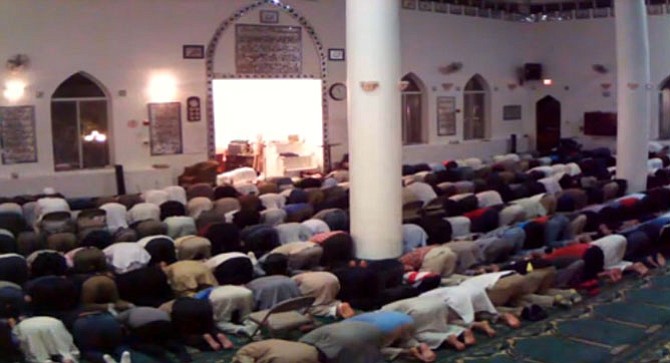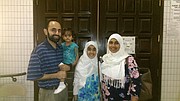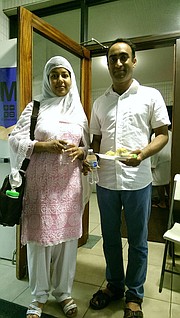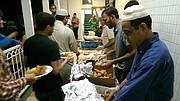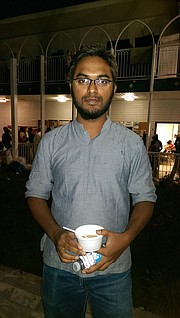Men at the Islamic Center Northern Virginia Trust bow during the evening’s last prayer Isha’. Image courtesy of the Islamic Center Northern Virginia Trust
One voice carries a melody in Arabic through the two-story hall of the Islamic Center Northern Virginia Trust, as over a hundred men bow their heads to the carpeted ground. Women and young children are in a designated area at the back and on the second floor. It’s 8:39 p.m. on July 2 and Maghrib is the last group prayer before breaking a daylong fast from food and water.
The group is observing Ramadan: a month of sacrifice and discipline on the Islamic lunar calendar. Typically, it includes fasting from dawn till dusk each day, additional praying and reciting from the Muslim holy book the Quran, and moral introspection.
“I just focus on myself and put down my goals,” said Mubashera Chaudhry of Fairfax. “Ramadan means purifying thoughts and goals as a human, and finding new ways to really connect with God.”
Chaudhry’s daughter Aishah is having an easier time with the fasting than last year. As she learns to ignore her hunger during the day, it helps her focus on personal improvements. “I try to be honest, clean, a good listener,” Aishah said. “Ramadan is about reconnecting to God and purifying your heart.”
EACH NIGHT OF THE WEEK, between two and 300 people come to the mosque for evening prayers and to break the day’s fast together, for unity, strength and fellowship. Though dates are a traditional favorite food for the meal iftar — they’re a good source of fiber and sugar — tonight’s menu also includes a mix of fried chicken, pizza, hearty chicken soup and spiced potato samosas.
The fast-breaking meals take on a festive atmosphere, culminating in a larger celebration at the end of the month, called Eid. This year, that date falls on July 17.
For Rashid Moin of Centreville, the fasting isn’t just about not eating and drinking. “It’s fasting from bad actions,” he said. “People are greedy for money, power and fame. If we can control our desires in the physical realm, we can control our thoughts, feelings and mental desires. Ramadan is great disciplining.”
Like the physical reward of fried chicken and water at the end of a day of fasting, Ramadan is also about individuals receiving spiritual rewards for doing good in the world.
“The main purpose is to make Allah happy,” said Moshiur Rahman of Fairfax. Rahman moved to Northern Virginia from Bangladesh just nine months ago to study at Virginia International University.
“Things are not good all year — this is a time to do all things at our best,” Rahman said. “When we do that we receive gifts directly from Allah. Ramadan is remembering to keep aware of these things.”
One of the gifts is perspective, a window into understanding more about the human condition.
Farhan Mahmoud Jamal, of Fairfax, said the fasting is another way to “empathize with other humans.” While realizing how little food and water a person can survive on, that motivates people to think and do more good in their lives, which helps their prayers get accepted. “You can be more productive,” said Jamal, “there’s an energy around good kinds of people.”
THE COMPASSIONATE ENERGY Jamal referred to is love, according to Dr. Muhammad Farooq of Woodbridge, president of the Islamic Center Northern Virginia Trust. “Love is keep on giving even when you’re receiving nothing.”
Between samosas and fried chicken pieces, Farooq contrasted the religion’s overarching compassionate philosophy with the negative image of Islam associated with “one to two percent of extremists.”
“The Quran emphasizes forgiveness for a prosperous society,” he said. “America being a just society is the ideal place for Islam.”
“Ramadan is training a person for 30 days how to be a better human being,” Farooq added.
The Islamic Center Northern Virginia Trust is located at 4420 Shirley Gate Road in Fairfax. For more information about prayer times or meals, call 703-591-0999 or visit www.icnvt.com.
